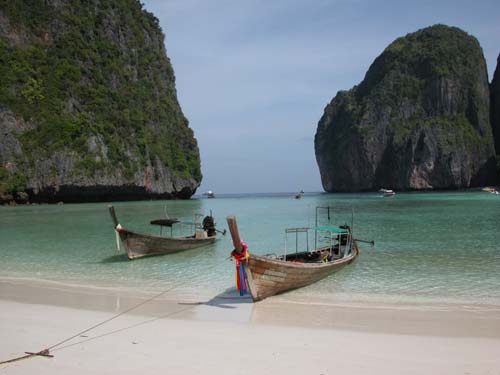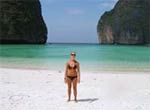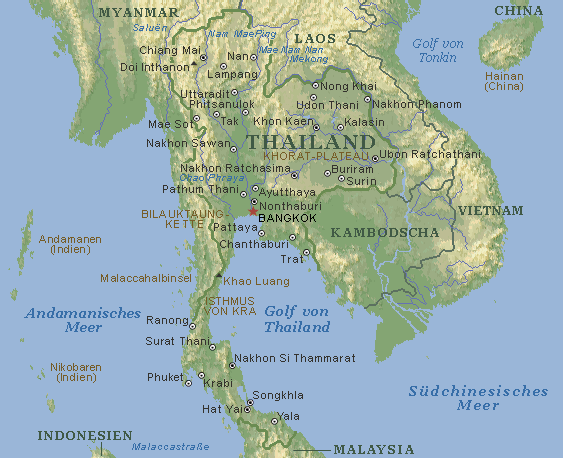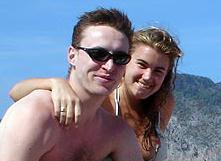MAYA BAY

Ao Maya: large, sheer-cliffed lagoon at the southwestern end of Phi Phi Ley
In Search of Paradise
During early 1999, Leonardo DiCaprio and the team behind the hit movie
Trainspotting came to Thailand in search of paradise. They found it on Phi Phi Ley in Southern Thailand.
Maya Bay was almost perfect with it's secluded beach and cliffs enclosing it on three sides. Other locations for
their movie, The Beach, included Phuket, Krabi and Khao Yai National Park in Central Thailand.
In The Beach, Leonardo DiCaprio portrays a young American thrill seeker named Richard, who arrives in Thailand with a rucksack on his back and adventure on his mind. Travel, Richard blatantly asserts, is the ongoing search for experience, the exalted quest for something different; however, trying to find anything like that on a planet saturated with guide books - there's the rub!
Young American Richard checks in to a cheap hotel in Bangkok and encounters Daffy, an older traveller ravaged by years of sun and drugs. It is Daffy, rambling and paranoid, who tells Richard the improbable tale of a secret island, a perfect place
on earth on which can be found the perfect beach unsullied by tourists. The next day, Richard finds a piece of
paper pinned to his door. It is a hand-drawn map of the mysterious island described by Daffy. This, Richard realises, may be
the "something different" he has been looking for ...
Along with two French travellers, Francoise and Etienne, Richard sets off on a journey inspired by Daffy's map. It is a
journey that sees them risking their lives: swimming across an open sea from one island to another, crawling past
armed guards, and jumping from the top of a forty-meter waterfall! Reaching their destination, the three adventurers
find a smug community of travellers like themselves, existing in secret and tranquil harmony with the island. The
new arrivals are quickly welcomed into the fold, and soon find that this island paradise, this perfect place, has become their home, sapping them of all will to return to the dull world they knew before.
Yet beneath the shiny surface, this Heaven on Earth is less than perfect! While personal conflict and petty jealousy
ferment to create a violent rivalry, a series of tragic events fragments the tight-knit community. Increasingly isolated and
disturbed, Richard finds himself witness to an incident of murderous bloodshed. Richard's dream of a perfect place has become a nightmare, and his imagined paradise turns into a perfect hell. Now, Richard's only goal is to leave, but escape will not be easy, for the beach is a very secret place, a secret place that some of the local inhabitants will defend to the very death!
Fantasy Island Meets Reality
BBC News
In January 1999, a crew from 20th Century Fox took over Maya Bay, on Phi Phi Ley, to shoot part of
The Beach, based on the novel by British author Alex Garland.
* The film-makers, led by director Danny Boyle and producer Andrew Macdonald, got permission from the country's
forestry department to flatten the beach and strip away much of the native vegetation to turn Maya Bay into the
fantasy beach depicted in Garland's novel.
But although Fox promised to restore the beach once filming had been completed, locals were outraged, as were
environmental activists who had seen Phi Phi Ley's neighbouring islands blighted by development.
They succeded in getting the number of coconut trees - a non-indigenous species - planted by the film-makers
reduced from 100 to 60, though attempts to get legal restrictions on filming failed.
Activists' anger increased when local tourism officials - eager to cash in on the publicity - started giving
travel agents free tickets to Thailand for so-called "DiCaprio tours".
PARADISE TOSSED
Sunday, December 26, 2004
The devastating tsunami that swept through the Indian Ocean following an underwater quake on December 26, 2004,
has left an indelible mark on the tourist landscape of Asia, but the smaller Phi Phi Ley remains intact and
the scenic Maya Bay, familiar to day-trippers, was not hit by the surge, although the resort island of Phi Phi,
popularised in the movie The Beach was hard hit. The tourist areas on Phi Phi Don, the larger island, have
been reduced to rubble.
Volunteers continue to search for survivors and help clean up. All beachfront properties suffered extensive
damage and most were simply swept away as the tsunami roared through the narrow, picturesque white-sand saddle
separating two low hills. Inspections of outlying coral are underway to assess undersea damage.

Update: January 18, 2005
The uninhabited Phi Phi Ley - including Maya and Losamah Bays - and Bamboo Island are now back on the tourist itinerary. Staying overnight in Phi Phi, while still possible in some of the northern resorts on Phi Phi Don, is not recommended, as the clean-up operation in the devastated Ton Sai village is far from finished.
* The global toll from the Asian tsunami has shot above 226,000 after Indonesia's health ministry confirmed the deaths of tens of thousands of people previously listed as missing. Hmm ... Could this be nature's way of telling us something's
wrong? Or is it just nature's way? Don't bother asking your local religious zealot.
Cyber Exorcism Blog Entry
Monday, January 3, 2005
Back in 2001 when I arrived in Koh Phi Phi, it looked like paradise to me. I stayed close to the beach, though
up on a hill where I could overlook the sea. Just yesterday I saw that beach again - on the news! All the huts were
gone, even the one I stayed in. Debris was all over the place, and corpses! I wondered what happened to that little Reggae
bar on the beach that played Bob Marley songs all the time, and to the friendly Thai family from whom I rented the hut, and to Andrew, the guy from England who took me on a snorkeling tour to Maya Bay on Ko Phi Phi Ley, the place where parts of the movie The Beach were shot. I suppose a dozen or so boats were in Maya Bay at the time the first wave hit the island
on the 26th of December, 2004. I hope and pray for the best ...
Three years ago it seemed to be such a peaceful place - there were no roads established, only a wooden pier and a small
landing platform for helicopters. I had to walk everywhere. Yet, Ko Phi Phi was already being hit by a slow but deadly wave
called mass tourism.
The beaches on one side of the island always looked nice, they were cleaned every day, but there were other beaches and
areas that tourists normally didn't visit – and that’s where you would find dumps filled with "icons" of western
tourists. It was bad enough that all the drinking water needed to be shipped to the island, but even worse was the fact
that it was sold in little bottles that most people would just throw away. And if you did not decline the offer, every
bottle came in a little plastic bag. I remember the hundreds of cans, mostly Coca Cola and Pepsi, which could be found
all over the island. Washed into the sea those cans and their toxins would become lethal for all kind of marine animals and
life. And then there were all the cigarette butts ...
When I left Ko Phi Phi I thought differently about it. On the pier, I talked to a girl from England who had stayed
in Ko Phi Phi for a couple of years. She was leaving the island on the same boat, and she vowed to never come back. She
said, "Ko Phi Phi used to be Paradise for me, but now its hell."

Phi Phi is situated in Krabi Province in southern Thailand. The two islands that make up this group - Phi Phi Don and Phi Phi Ley - are about 40 kilometres south-west of Krabi City . The islands are about equidistant from Krabi and Phuket, and are famed for their spectacular landscapes. Rock climbers are attracted by the breathtaking cliffs with their tall sheer walls of limestone. Nature lovers find a haven in the islands' transparent seas and corel beds which are home to a wide range of sea life.
Note: Phi Phi means "many ghosts" in Thai, and never was the meaning more appropriate for an island where countless human
corpses remain under the rubble waiting to be exumed ...
Phi Phi Ley is a smaller relative of the main island. Strangely, Maya Bay, the beach which was The Beach, was relatively untouched by the tsunami.

Journal Entry, December 26, 2004
Antonia Bothner, Johannesburg, South Africa
At the time the Tsunami actually struck I was doing my advanced diving course at Bida Nok, which is 30 kms South of Phi Phi Island. I did not really notice much, except that when we went to Maya Bay, it was completely covered in water and there were no boats docked, which is very unusual! The calm bay where we normally anchored to have lunch was churning white water and no one knew what was going on. We decided to head back to Phi Phi as the next dive was deemed unsafe ...
On the way back, a boat came up close to us with a frantic guy who had a few cuts, and who was yelling at us to use a cellphone. He claimed that a 7-meter tidal wave had hit Phi Phi island which was now flattened except for the Phi Phi Hotel. We couldn't quite grasp what he had told us, and sincerely believed that possibly he was in shock and was maybe exaggerating because of his present state of mind; however, we were to be proved to be wrong ...
There Is No Perfect Place
Phi Phi is a fifty-minute ride by boat from Phuket. Care to take a trip? It may just be that perfect holiday place you
have always been looking for! Bon Voyage! Have a nice stay! There is no perfect place: Utopia remains a highly imaginary and indefinite destination. At any moment, the earth can throw you off its back or simply wash you away. Don't be caught singing the tsunami blues on the other side of this lonely planet because you wanted to stay another day in some imagined paradise. The laws of chance are not the laws of fate. Anything can happen at any time at any place. You see, impermanence is inherent in all things including perfect places, so work out your own salvation with diligence. Om mani padme hum.
* * *
|
Various notes appended and edited @buddhavision
|